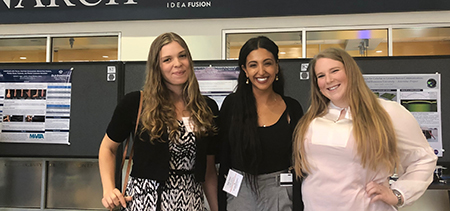
The Role of Academic Debt and Benefits to the Profession on the Interest of Professional Post-Baccalaureate Athletic Training Students’ in a Doctor of Athletic Training Degree
College
College of Health Sciences
Program
Ph.D. Health Services Research
Publication Date
3-28-2019
Abstract
Context: The requirement of completing a post-baccalaureate degree for entry into clinical practice will necessitate advanced degree seekers to consider their academic debt (AD) and benefits to the profession. We examined interest in a Doctor of Athletic Training (DAT) degree, concerns regarding AD, and perceptions of benefits to the profession of currently enrolled post-baccalaureate athletic training students. Methods: 15 of 51 programs that met the inclusion criteria comprising 287 students (91 Males, 193 females) in this cross sectional study. Participants completed a 6 theme survey. Questions were asked in select one, open-ended, and 4-point Likert scale formats. The main outcome measures for this part of the survey were interest in a DAT, amount of AD, and perceptions of the impact of a DAT on benefits to the profession. Statistics were calculated using IBM SPSS (Version 24; Armonk, NY). Descriptive statistics were used to calculate percentages and frequencies. Mann-Whitney U tests were used to assess group differences in interest in pursuing the degree (P<0.05). Results: 170 participants were minimally interested in pursuing a DAT, while 115 were moderately or extremely interested. 125 participants reported debt accrual of post-baccalaureate programming to range between $40,000 and $80,000, with 63 students accruing over $80,000. AD did not differ between groups for pursuing aDAT (P=.906). Participants agreed that aDATwould increase salary (n=202), lead to job candidacy (n=226) or diverse setting employment (n=212), increase in professional recognition (n=240), increasing awareness, (n=228) increase respect (n=229) and collaboration (n=221) amongst and with healthcare providers and within the public (n=210). Conclusions: Accumulation of AD does not affect interest in pursuing a DAT within post-baccalaureate students. They think that the DAT will be linked to increases in salary and recognition. Future research should examine perceptions of DAT completers and employment, debt accumulation, and debt to earnings ratio.
Files
Recommended Citation
Cohen, Gary; Medina, R; Hoffman, E; Paladin, S; Clines, S; Welch Bacon, C E.; Eberman, L E.; Cavallario, J; and Van Lunen, B L., "The Role of Academic Debt and Benefits to the Profession on the Interest of Professional Post-Baccalaureate Athletic Training Students’ in a Doctor of Athletic Training Degree" (2019). College of Health Sciences Posters. 17.
https://digitalcommons.odu.edu/health_sciences/17



